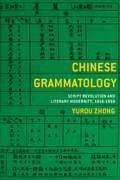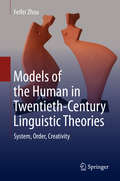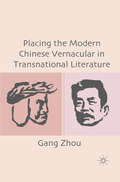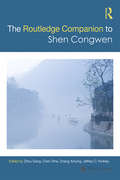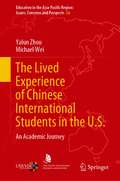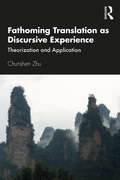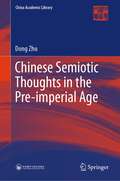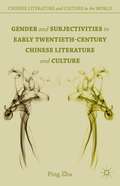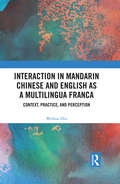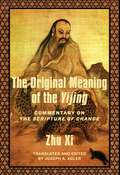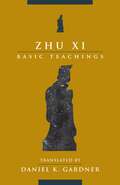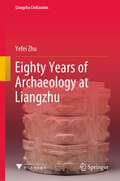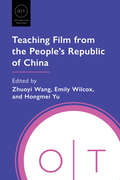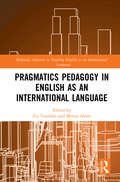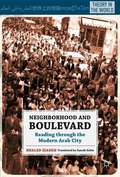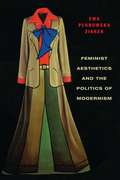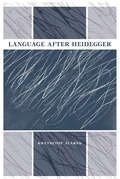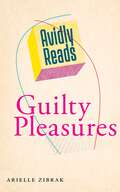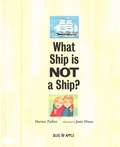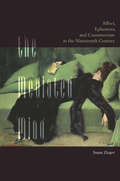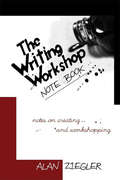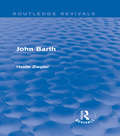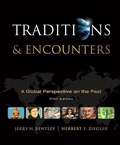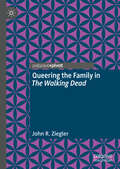- Table View
- List View
Chinese Grammatology: Script Revolution and Literary Modernity, 1916–1958
by Yurou ZhongToday, Chinese characters are described as a national treasure, the core of the nation’s civilizational identity. Yet for nearly half of the twentieth century, reformers waged war on the Chinese script. They declared it an archaic hindrance to modernization, portraying the ancient system of writing as a roadblock to literacy and therefore science and democracy. Movements spanning the political spectrum proposed abandonment of characters and alphabetization of Chinese writing, although in the end the Communist Party opted for character simplification.Chinese Grammatology traces the origins, transmutations, and containment of this script revolution to provide a groundbreaking account of its formative effects on Chinese literature and culture, and lasting implications for the encounter between the alphabetic and nonalphabet worlds. Yurou Zhong explores the growth of competing Romanization and Latinization movements aligned with the clashing Nationalists and Communists. She finds surprising affinities between alphabetic reform and modern Chinese literary movements and examines the politics of literacy programs and mass education against the backdrop of war and revolution. Zhong places the Chinese script revolution in the global context of a phonocentric dominance that privileges phonetic writing, contending that the eventual retention of characters constituted an anti-ethnocentric, anti-imperial critique that coincided with postwar decolonization movements and predated the emergence of Deconstructionism. By revealing the consequences of one of the biggest linguistic experiments in history, Chinese Grammatology provides an ambitious rethinking of the origins of Chinese literary modernity and the politics of the science of writing.
Models of the Human in Twentieth-Century Linguistic Theories: System, Order, Creativity
by Feifei ZhouThis book provides a refreshingly new perspective for investigating linguistic texts, which foregrounds models of the human. It presents a close reading of major linguistic theories in the twentieth century with a focus on three main themes: linguistic system and the individual speaker; social order; and linguistic creativity. The examination of these three fundamental themes concerning language and human nature, on the one hand, provides a fine-textured exposition on the implicit and explicit models of human nature endorsed by major theorists; on the other, it reveals the methodological dilemmas faced by linguistics. In light of the fact that the importance of considering posthumanist ideas is increasingly being underscored today, both within and outside linguistics, this focus on the human makes the book highly topical.
Placing the Modern Chinese Vernacular in Transnational Literature
by Gang ZhouThis is the first book to concentrate not only on the triumph of the vernacular in modern China but also on the critical role of the rise of the vernacular in world literature, invoking parallel cases from countries throughout Europe and Asia.
Routledge Companion to Shen Congwen (Chinese Literature Series from a Global Perspective)
by Gang Zhou Sihe Chen Zhang Xinying Jeffrey C KinkleyThis volume is about studies of Shen Congwen (1902–1988), one of the most important writers in modern China, but more importantly, it is about how Shen Congwen has been received in and beyond Mainland China. By presenting the best literary criticism on Shen Congwen in Mainland China over the past 80 years, and views of how Shen Congwen has been understood, interpreted, and appreciated in Japan, the US, and Europe, the editors propose a new way to approach the topics of canonic writers, modern Chinese literature, and world literature. <P><P> This is itself a translated project. Its Chinese edition appeared in May 2017. The bilingual rendering of the best criticism of Shen Congwen from a global perspective intends to initiate and advance dialogues between Chinese- and English- language scholarly communities. We strive to explore the complexities of “worldwide” images and interpretations of Shen Congwen. By calling attention to the foreign spaces into which overseas Shen Congwens and modern Chinese literature are reborn as world literature, we acknowledge and celebrate the study of Shen Congwen and modern Chinese literature as ongoing and endless cross-cultural dialogues and manifestations.
The Lived Experience of Chinese International Students in the U.S.: An Academic Journey (Education in the Asia-Pacific Region: Issues, Concerns and Prospects #56)
by Yalun Zhou Michael WeiThis book marks a departure from traditional assumptions concerning the deficiencies of Chinese international students in terms of learning and adapting. It employs phenomenological narrative inquiry and a small culture approach to investigate the evolved, fluid experience of pursuing a graduate degree in the U.S. at Blue Fountain University (a pseudonym for a mid-western university).Adopting an interdisciplinary perspective, this book addresses two fundamental questions: What study abroad is and what study abroad counts? The sociocultural dimensions that shape the cross-border degree seeking endeavors inform stakeholders what works for Chinese international students’ successful pursuits as EFL learners and ESL users and what could be improved. This book shares thoughts on the implications and impact of educational contexts to stakeholders at normal and dynamic contexts interrupted by global pandemic outbreak. It contributes to the understanding of the internationalization of the host institute and the EFL education reform efforts (policy making, teacher education, and classroom practice) in China (and in Asia at large).
Fathoming Translation as Discursive Experience: Theorization and Application
by Chunshen ZhuIn his positive approach to translation studies featured in this highly original volume, Chunshen Zhu brings into perspective from the vantage point of translation the workings of human factors in text production, interpretation, and dissemination in and through translation in varying social situations. This book examines a variety of key issues heatedly debated or largely neglected in the field of translation studies and beyond, for example, meaning making, nature of the Unit of Translation, augmentation of transitivity by modification, signification of repetition, and cognitive effects of syntactic iconicity, by critically engaging insights from functional linguistics and philosophy of language, among other fields of study. These issue-driven, phenomenon-focused, and theorization-oriented studies, presented in eight chapters with ample exemplification and case studies, form a coherent whole to bring a network of correlations between theory and practice, linguistics and literature, form and content, information structure and communicative function, intention and effect, and textuality and experience to bear upon the study of translation, fathoming its depths not only as a linguistic operation but more significantly as a textually accountable process of intersubjective and cross-lingual sign making that facilitates humans’ understanding of themselves and of the world. The book is therefore a useful reference for scholars, teachers, and postgraduate and research students who are interested in a comprehensive yet focused approach to translation as an academic subject straddling linguistics and literary, cultural, and social studies, as well as for those who would like to observe bilingualism and cross-cultural communication through translation in general and translation involving the Chinese language in particular.
Chinese Semiotic Thoughts in the Pre-imperial Age (China Academic Library)
by Dong ZhuThis book examines practices on the relationship between sign and meaning in the Pre-Imperial period of China from the semiotics perspective. Although the Chinese civilization did not develop a comprehensive semiotics system in that period, they are highly semiotic in many ways. The thinking and application of signs of Chinese people can be found in many classics, such as The Book of Changes, The Analects of Confucius, Tao De Jing and Zhuangzi. This book begins its study by re-examining the semiotic thoughts contained in The Book of Changes and inquiries into the thoughts of the major philosophers of different schools. It provides insights into the findings of these philosophers concerning the relationship between sign and meaning. In particular, it concentrates on how the prosperity of the various contending semiotic thoughts complemented each other in forming a sign system. In addition, the book also emphasizes the wholeness and associativity of observing things and studying relevant signs of Chinese people. As the first monograph in any language to systematically summarize Chinese semiotic thought in the Pre-Imperial period, this book helps promote understanding of the traditional Chinese culture and mindset.
Gender and Subjectivities in Early Twentieth-Century Chinese Literature and Culture
by Ping ZhuGender and Subjectivities in Early Twentieth-Century Chinese Literature and Culture offers an in-depth study on how late Qing and modern Chinese intellectuals used gender as a discursive battlefield to demand power vis-#65533;-vis colonial discourses. Through a combination of cultural analysis and literary analysis, including discussions of modern Chinese writers such as Lu Xun, Yu Dafu, Zhang Ziping, Guo Moruo, Mu Shiying, Liu Na'ou, Bai Wei, and Ding Ling, Ping Zhu shows the resilience andmalleability of Chinese modernity via a femininity imagined an empowered and empowering. By focusing on 'the feminine at large,' this book draws a contrasting image of the docile, contained feminine in colonial gender ideology to provide one salient example of China's politics of resistance.
Interaction in Mandarin Chinese and English as a Multilingua Franca: Context, Practice, and Perception
by Weihua ZhuInteraction in Mandarin Chinese and English as a Multilingua Franca: Context, Practice, and Perception proposes a model of context, practice, and perception and raises awareness of the importance of understanding language use and perception in context in order to avoid intercultural communication misunderstandings. This book provides an overview of previous research on the pragmatics of Chinese and English as a multilingua franca in multilingual contexts. It argues that context is socioculturally shaped, interactionally constructed, and personally related. Context can influence and be established by the practice and perception of communicative acts. This book also combines the proposed model with the discursive-interactional approach to uncover the interplay of context, practice, and perception of extended concurrent speech for strong disagreement by native Chinese speakers in spontaneous conversations in Mandarin and English as a multilingua franca.
The Original Meaning of the Yijing: Commentary on the Scripture of Change (Translations from the Asian Classics)
by Xi ZhuThe Yijing (I Ching), or Scripture of Change, is traditionally considered the first and most profound of the Chinese classics. Originally a divination manual based on trigrams and hexagrams, by the beginning of the first millennium it had acquired written explanations and a series of appendices attributed to Confucius, which transformed it into a work of wisdom literature as well as divination. Over the centuries, hundreds of commentaries were written on it, but for the past thousand years, one of the most influential has been that of Zhu Xi (1130–1200), who synthesized the major interpretive approaches to the text and integrated it into his system of moral self-cultivation.Joseph A. Adler’s translation of the Yijing includes for the first time in English Zhu Xi’s commentary in full. Adler explores Zhu Xi’s interpretation of the text and situates it in the context of his overall theoretical system. Zhu Xi held that the Yijing was originally composed for the purpose of divination by the mythic sage Fuxi, who intended to create a system to aid decision making. The text’s meaning, therefore, could not be captured by a single commentator; it would emerge for each person through the process of divination. This translation makes available to the English-language audience a crucial text in the history of Chinese religion and philosophy, with an introduction and translator’s notes that explain its intellectual and historical context.
Zhu Xi: Basic Teachings
by Xi ZhuZhu Xi (1130–1200) was the preeminent Confucian thinker of the Song dynasty (960–1279). His teachings profoundly influenced China, where for centuries after his death they formed the basis of the country’s educational system. In Korea, Japan, and Vietnam as well, elites embraced his inspired and authoritative synthesis of Confucian thought.In Zhu’s eyes, the great Way of China was in decline, with its very survival threatened by external enemies and internal moral weakness. In his writings and teaching, Zhu took as his mission the revival of the Confucian tradition, the source of China’s greatness, and its transmission to future generations. For him, restoring Confucianism to its rightful place required drawing on the tradition’s whole sweep, from the sacred texts of the sages and worthies of antiquity to the more recent writings of the great thinkers of the tenth and eleventh centuries.This book presents the essential teachings of the new Confucian (“Neo-Confucian”) philosophical system that Zhu Xi forged, providing a concise introduction to one of the most important figures in the history of Chinese thought. It offers selections from the Classified Conversations of Master Zhu (Zhuzi yulei), a lengthy collection of Zhu’s conversations with disciples. In these texts, Zhu Xi reflects on the Confucian teachings of the past, revising and refining his understanding of them and shaping that understanding into a cohesive system of thought. Daniel K. Gardner’s translation renders these discussions and sayings in a conversational style that is accessible to new and more advanced readers alike.
Eighty Years of Archaeology at Liangzhu (Liangzhu Civilization)
by Yefei ZhuThis book summary introduces the key research findings, exploration and excavation works carried out during the 80 years of archaeological endeavours entirely devoted to Liangzhu historical sites. Xingeng SHI first discovered of neolithic remains in 1936, followed along with designation of official name which was given by Nai XIA in 1959. Another perspective also indicates finding of several pieces of black pottery at the Qipanfen historical site in the year 1936 till the latest over 1200 pieces of jades unearthed in Fanshan cemetery in the year 1986. A brief timeline history as listed above has been demonstrated that the great efforts and sacrifices had made by earlier generations of archaeologist in Liangzhu as witness to explore the origin of the 5000 years of Chinese civilization. The public is more familiar with Fanshan cemetery and Liangzhu ancient city as well as precious cultural relics such as jade Cong and jade Yue. Through the 80 years of archaeological ruins of Liangzhu field works that performed, in fact, there are existing historical monuments for example as places of Zhucundou and Wujiabu and ordinary objects include pottery and stoneware, they remain unknown to the general public. This book offers the readers a unique perspective, is the first research to focus on the Liangzhu Archaeological Team members’ viewpoint of exploring the perceived value of an extraordinary experience and compare it with an ordinary experience behind the 80 years of archaeology of the Liangzhu site.
Teaching Film from the People's Republic of China (Options for Teaching)
by Zhuoyi Wang, Emily Wilcox, and Hongmei YuThis volume brings a diverse range of voices--from anthropology, communication studies, ethnomusicology, film, history, literature, linguistics, sociology, theater, and urban geography--into the conversation about film from the People's Republic of China. Essays seek to answer what films can reveal or obscure about Chinese history and society and demonstrate how studying films from the PRC can introduce students to larger issues of historical consciousness and media representation.The volume addresses not only postsocialist fictional films but also a wide variety of other subjects including socialist period films, documentaries, films by or about people from ethnic minority groups, film music, the perspectives of female characters, martial arts cinema, and remakes of South Korean films. By exploring how films represent power, traditions, and ideologies, students learn about both the complexity of the PRC and the importance of cross-cultural and cross-ideological understanding.
Pragmatics Pedagogy in English as an International Language (Routledge Advances in Teaching English as an International Language Series)
by Zia Tajeddin and Minoo AlemiPragmatics Pedagogy in English as an International Language aims to bring to light L2 pragmatics instruction and assessment in relation to English as an International Language (EIL). The chapters in this book deal with a range of pedagogically related topics, including the historical interface between L2 pragmatics and EIL, reconceptualization of pragmatic competence in EIL, intercultural dimension of pragmatics pedagogy in EIL, teacher pragmatic awareness of instruction in the context of EIL, pragmatics of politeness in EIL, pragmatic teaching materials for EIL pedagogy, teachers’ and scholars’ perceptions of pragmatics pedagogy in EIL, assessment and assessment criteria in EIL-aware pragmatics, and methods for research into pragmatics in EIL. This book is different from other books about both EIL pedagogy and pragmatics pedagogy. Exploring the interface between different dimensions of pragmatics pedagogy and EIL, it suggests instructional and assessment tasks for EIL-aware pedagogy and directions for research on EIL-based pragmatics pedagogy. Pragmatics Pedagogy in English as an International Language will be useful for a range of readers who have an interest in the pragmatics instruction and assessment of EIL as well as those whose main area of specialization is EIL but would like to know how EIL, with its rich conceptual and empirical background, can go beyond linguistic instruction to embrace the instruction of pragmatic competence.
Neighborhood and Boulevard
by Khaled ZiadehCombines the styles of memoir, history, anthropology, and theory to develop an innovative reflection on the materiality of culture. Through its style and content, the text challenges the Orientalist bifurcation between tradition and modernity in the Arab world, revealing instead tradition's own dynamism and its coexistence alongside modernity.
Feminist Aesthetics and the Politics of Modernism (Columbia Themes in Philosophy, Social Criticism, and the Arts)
by Ewa Płonowska ZiarekEwa Ziarek fully articulates a feminist aesthetics, focusing on the struggle for freedom in women's literary and political modernism and the devastating impact of racist violence and sexism. She examines the contradiction between women's transformative literary and political practices and the oppressive realities of racist violence and sexism, and she situates these tensions within the entrenched opposition between revolt and melancholia in studies of modernity and within the friction between material injuries and experimental aesthetic forms. Ziarek's political and aesthetic investigations concern the exclusion and destruction of women in politics and literary production and the transformation of this oppression into the inaugural possibilities of writing and action. Her study is one of the first to combine an in-depth engagement with philosophical aesthetics, especially the work of Theodor W. Adorno, with women's literary modernism, particularly the writing of Virginia Woolf and Nella Larsen, along with feminist theories on the politics of race and gender. By bringing seemingly apolitical, gender-neutral debates about modernism's experimental forms together with an analysis of violence and destroyed materialities, Ziarek challenges both the anti-aesthetic subordination of modern literature to its political uses and the appreciation of art's emancipatory potential at the expense of feminist and anti-racist political struggles.
Language after Heidegger
by Krzysztof Ziarek John SallisWorking from newly available texts in Heidegger's Complete Works, Krzysztof Ziarek presents Heidegger at his most radical and demonstrates how the thinker's daring use of language is an integral part of his philosophical expression. Ziarek emphasizes the liberating potential of language as an event that discloses being and amplifies Heidegger's call for a transformative approach to poetry, power, and ultimately, philosophy.
Avidly Reads Guilty Pleasures
by Arielle Zibrak"My guilty pleasure wasn’t just reading low-brow fiction or even female-authored fiction, it was being femme itself."What is it about ribald romance novels, luxurious interior design, and frothy wedding dresses that often make women feel their desires come with a shadow of shame? In Avidly Reads Guilty Pleasures, Arielle Zibrak considers the specifically pleasurable forms of feminine guilt and desire stimulated by supposedly “lowbrow” aesthetic tendencies. She takes up the overwhelming preoccupation with the experience of being humiliated, dominated, or even abused that has pervaded the stories that make up women’s culture—from eighteenth-century epistolary novels to popular twentieth-century teen magazine features to present-day romantic comedies.In three chapters—“Rough Sex,” “Expensive Sheets,” and “Saying Yes to the Dress”—that mirror the plot structures of feminine fictions themselves, this book tells the story of the desires that only the guiltiest of pleasures evoke. Zibrak reexamines documents of femme culture long dismissed as “trash” to reveal the surprisingly cathartic experiences produced by tales of domination, privilege, and the material trappings of the heteropatriarchy.Part of the Avidly Reads series, this slim book gives us a new way of looking at American culture. With the singular blend of personal reflection and cultural criticism featured in the series, Avidly Reads Guilty Pleasures reclaims women’s experiences for themselves.
What Ship Is Not a Ship
by Harriet ZiefertWhat language lesson doesn't seem like a lesson? The fun guessing game inside this book! Clever word groupings list three things that are alike and one that it is different. For example, there are living rooms, bedrooms, and bathrooms, but a mushroom is not a room! Picture clues will help kids figure out which thing is different and begin to grasp fine-tuned nuances of word parts, roots, and meanings. In addition, the text's guessing-game approach invites kids into a call-and-response dynamic. This title is a great companion to the well-received Do You Know Which Ones Will Grow? and What Is Part This, Part That?
The Mediated Mind: Affect, Ephemera, and Consumerism in the Nineteenth Century
by Susan ZiegerHow did we arrive at our contemporary consumer media economy? Why are we now fixated on screens, imbibing information that constantly expires, and longing for more direct or authentic kinds of experience? The Mediated Mind answers these questions by revisiting a previous media revolution, the nineteenth-century explosion of mass print. Like our own smartphone screens, printed paper and imprinted objects touched the most intimate regions of nineteenth-century life. The rise of this printed ephemera, and its new information economy, generated modern consumer experiences such as voracious collecting and curating, fantasies of disembodied mental travel, and information addiction. Susan Zieger demonstrates how the nineteenth century established affective, psychological, social, and cultural habits of media consumption that we still experience, even as pixels supersede paper. Revealing the history of our own moment, The Mediated Mind challenges the commonplace assumption that our own new media lack a past, or that our own experiences are unprecedented.
The Writing Workshop Note Book: Notes on Creating and Workshopping
by Alan ZieglerThe Writing Workshop Notebook is devoted to making, remaking, and remarking on writing. Ziegler's text is animated by a concern about how we relate to our own and others’ writing and by a desire to have a suitable effect on the reader’s experience with writing and critiquing. The book is supported by the author's experience from decades of leading writing workshops.
Facing Texts: Encounters Between Contemporary Writers and Critics
by Heide ZieglerThis selection of fiction by many of America's best writers, each coupled with a distinguished critic's response, is designed to defy the chronological secondariness of critical interpretation. During the creation of this book the majority of the contributions, chosen by the writers themselves, were as yet unpublished, providing an unmediated encounter between author and critic. Every reader extends what editors, authors, and critics have begun by adding to the imaginary space in which all texts may be woven together. This process serves as metaphor for the changing nature of any latter-day encounter with one's own literary tradition. The interfacing of texts not only illuminates the fiction, and the relationship of fiction to critics, but also informs our conceptions of text, criticism, and fiction itself.
John Barth (Routledge Revivals)
by Heide ZieglerJohn Barth represents most completely what has been termed postmodernism, not because his work comprises more postmodernist features than other contemporary writers but because, for Barth, "life" and "art" are two sides of the same coin. In this brief study, first published in 1987, Heide Ziegler examines all Barth’s novels. She argues that each pair of novels first "exhausts" and then "replenishes" those literary genres that hinge on a particular world view: the existentialist novel, the Bildungsroman, the Kunstlerroman, or the realistic novel. Through the division of labour between character and author Barth manages to develop a new mode of literary parody which projects itself beyond the mocked literary model and even self-parody into the realm of future fiction. This book is ideal for students of literature and postmodern studies.
Traditions and Encounters: A Global Perspective on the Past (5th Edition)
by Herbert F. Ziegler Jerry H. BentleyConnect students to the stories of history. Connect students to the experience of history. Connect students to success in history. At McGraw-Hill, we have dedicated the past few years to deepening our understanding of student and instructor experience. Employing a wide array of research tools including surveys, focus groups, and ethnographic studies, we've identified areas in need of improvement to provide an opportunity for greater learning and teaching experiences. The fifth edition of Traditions & Encounters is a result of this. Traditions & Encounters also has a rich history of firsts: the first world history text to take a truly global perspective on the past; the first to emphasize connections among cultures; the first to combine twin themes with a seven-part framework, making the huge story of world history more manageable to both teach and learn. Now Traditions & Encounters becomes the first truly interactive world history program: one that marries groundbreaking adaptive diagnostics and interactivities with a captivating narrative and engaging visuals, creating a unique learning environment that propels greater student success and better course results. Instructors gain insight into students' engagement and understanding as students develop a base of knowledge and construct critical thinking skills. Chapter-opening vignettes and a lively narrative keep students turning the page while the adaptive questioning for each chapter and the personalized study plan for each individual student help students prepare for class discussions and course work. With its hallmark of twin themes, Traditions & Encounters continues to tell the story of the cultures and interactions that have shaped world history, while adding redesigned maps, new primary sources, and new chapter- and part-level features that strengthen connections and prompt students to analyze the events and themes in order to build a greater understanding of the past and an appreciation of history's influence on the present. Students are no longer simply reading; they are reading, interacting, and engaging in a visual, auditory, and hands-on learning experience. Give students an experience. Improve course participation and performance. Experience Traditions & Encounters, and experience success.
Queering the Family in The Walking Dead
by John R. ZieglerThis book traces how The Walking Dead franchise narratively, visually, and rhetorically represents transgressions against heteronormativity and the nuclear family. The introduction argues that The Walking Dead reflects cultural anxiety over threats to the family. Chapter 1 examines the destructive competition created by heteronormativity, such as the conflict between Rick and Shane. Chapter 2 focuses on the actual or attempted participation of characters such as Carol and Negan in queer relationships. Chapter 3 interprets zombies as queer antagonists to heteronormativity, while Chapter 4 explores the incorporation of zombies into the lives of characters such as the Governor and the Whisperers. The conclusion asserts that The Walking Dead presents both queer alternatives to and damaging contradictions within the traditional heterosexual family model, helping to question this model and to consider the struggle of queer American families. Overall, this study holds special interest for students and scholars of queerness, zombies, and the family.
